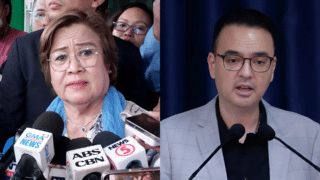The Duterte administration is faced with a dilemma that’s unprecedented in our country’s history. It has to deal with a complicated health and hunger pendulum. The COVID-19 pandemic requires our government to do a very difficult balancing act. On one hand, it must impose strict health quarantine rules in order to stop the spread of the virus. On the other hand, it must allow business activity to prevent massive unemployment that can result in widespread hunger. The whole world will be in this quandary for two years or more, experts say.
The problem is inherently difficult, and our government deserves a large degree of commiseration, because even the most powerful countries in the world are stumbling in their own efforts to calibrate the swing of the pendulum. Our country’s situation is made worse by our inadequate resources and the overwhelming poverty in our midst.
However, our government exacerbates its stumbling tribulations because of its decision-making process. President Duterte issues orders from Mount Olympus by exclusively consulting, and even leaving the decisions to, his retinue of gods. These gods are the members of the Inter-Agency Task Force (IATF) for the Management of Emerging Infectious Diseases who are mostly former military men, macroeconomic advisers, and former secretaries of the Department of Health.
The resulting decisions are academic and technocratic. They are cold military-nuanced solutions, and they largely address view-from-the-mountain problems. The commanded solutions blared from the mountaintop have been missing the intermediate troubles that occupy the wide space between the opposite poles of health and hunger. They miss the different shades of humanity that are only visible on the ground. They ignore the yawning dissimilarities between urban and rural settings.
The missteps would be greatly minimized if President Duterte trained his ears on the ground by quickly listening to and obtaining swift advice from governors, mayors, barangay captains, and even sectoral representatives before he issues directives. Word on the ground is that leaders of local government units (LGUs) are simmering in anger because they’re reduced to the role of wrath-absorbers. Local leaders are at the receiving end of the scorn of enraged citizens because of the fumbles of the national government.
Even short and informal phone consultations with leaders of LGU organizations and affected sectors can infuse national decisions with grounded empathy, because the macro viewpoint must be balanced by a micro perspective of this unparalleled crisis.
Mr. Duterte should know all too well the pitfalls of national impositions devoid of LGU consultations, because of his long stint as a mayor. He must be assuming that the local perspective is ingrained in his thought process. The President is making a mistaken assumption, judging from the way he heavily perorates on communist rebels and the drug menace even when the whole country stays up late expecting to hear him talk about health and hunger. No leader has ever experienced the colossal challenges we now face, and this should prompt the President to hear out LGU leaders on the many travails currently experienced by their varied communities.
The abundance of so many issues in between health and hunger prevents an exhaustive discourse in this limited space. But to cite just one example, the serious strain on people’s mental health resulting from long house confinement is an emerging major concern. The people’s freedom of movement has never been curtailed this long, and our fear of the unknown has never been tested this long as well. If the general community quarantine, with its stifling restrictions on movement, will be the new normal in our lives, the government must formulate rules allowing periodic access to public parks, open spaces, the beach (for seaside communities), and even museums, where people can revitalize their mental sanity under strict social distancing rules.
In this extraordinary time, the need for our government to listen to voices on the ground is a critical necessity.
Comments to fleamarketofideas@gmail.com


